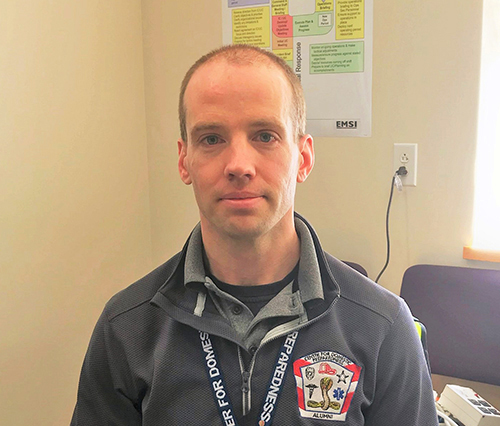"Mark is a workhorse; he is always grinding away on something that is necessary for the EOC, he is one of the most dedicated people in the fight against COVID-19." - Shawn Candella, SCC deputy CEO
 Mark MacFarlane used to spend much of his day helping to resolve resident concerns at the Special Commitment Center, addressing how to make services and events more inclusive for disabled residents.
Mark MacFarlane used to spend much of his day helping to resolve resident concerns at the Special Commitment Center, addressing how to make services and events more inclusive for disabled residents.
That all changed when the COVID-19 pandemic put Washington into a state of isolation. For many places, social distancing and remote working have been difficult. But for the SCC on McNeil Island, those mandates created a unique set of problems that MacFarlane, the facility’s safety and risk manager, helped solve.
“I spend most of my day interacting with people,” he said. “I’ve become much more of a liaison between a lot of different components.”
MacFarlane is managing and setting up the emergency operations center — from running cables and to setting up workspaces — consolidating personal protective equipment, helping with logistics, the COVID-19 screening process and even the commute to work.
“There’s not a lot of room in here, so it’s kind of hard to social distance in the EOC, but we’re making it work,” he said.
Employees and visitors can only get to the facility by boat, so MacFarlane was part of the team that devised policies that have kept SCC free of coronavirus cases.
“Mark is a workhorse; he is always grinding away on something that is beneficial (or) necessary for the EOC,” said Shawn Candella, SCC deputy CEO. “He is one of the most dedicated people in the fight against COVID-19.”
Waging war against an unseen enemy is difficult, and MacFarlane – who also has been a firefighter paramedic for about 20 years – used his knowledge and experience in the medical field to help craft a plan to screen everyone before they travel to the island. Each staff member or visitor must pass a security screen before walking an acceptable distance from other passengers to the ferry, which is marked with seating set 6 feet apart and limited to a maximum of 50 people.
“Nobody gets to the facility without being screened,” MacFarlane said. “We’ve gotten to the point where we’re keeping people almost 6 feet apart for the entire journey over here.”
SCC has also sent about 100 staffers — approximately one-fourth of the facility’s staff — home to telework and changed work schedules to lessen the number of people on site at one time.
“People have been pretty good about it,” MacFarlane said. “They understand why they do it.”
That sense of understanding and unity has stuck with MacFarlane. At some point the world will return to normal, and he will fill his days with paperwork and concerns from SCC residents, but he expects some things to continue long after the pandemic ends.
(Story by Rob Johnson)
